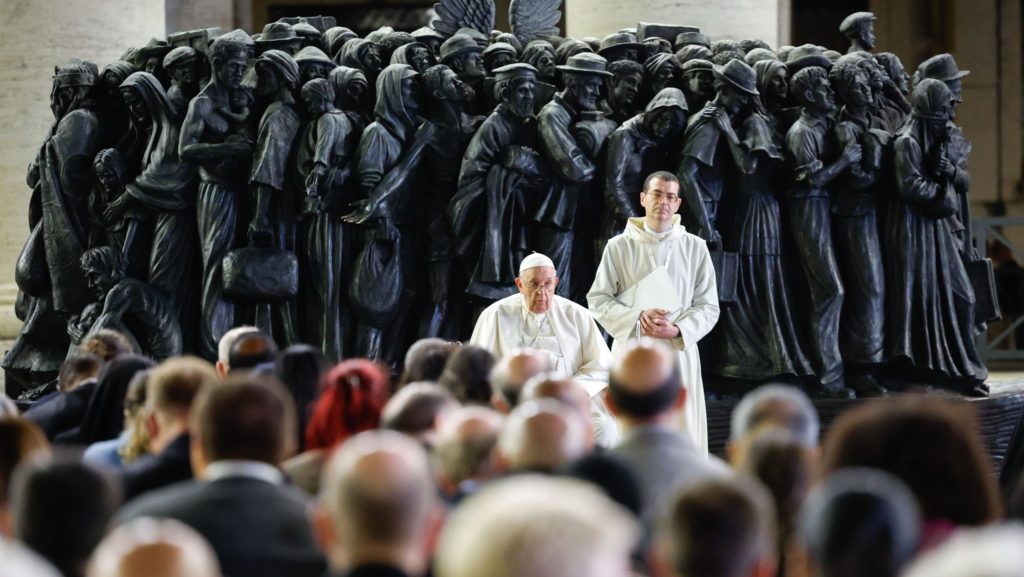When Pope Francis issued a letter to the United States bishops criticizing President Donald Trump’s plan for mass deportations and offering a theological retort to Vice President J.D. Vance, the tone and tenor of the letter struck many as surprising.
“The rightly formed conscience cannot fail to make a critical judgment and express its disagreement with any measure that tacitly or explicitly identifies the illegal status of some migrants with criminality,” wrote the pope of the deportation plan in the Feb. 11 letter.
He also made a pointed response to remarks made by Vance, who’d suggested in an interview with Fox News that, based on his understanding of the theological principle known as “ordo amoris,” Christian love begins locally and radiates out, meaning that it gives priority to people closest to us over outsiders or foreigners.
Without naming Vance, Pope Francis replied that Christian love is in fact applied to all, “without exception.”
“What is built on the basis of force, and not on the truth about the equal dignity of every human being, begins badly and will end badly,” he warned.
While such direct candor from the pope is unusual, it is hardly unprecedented to see a pope directly engage the political affairs of a given nation.
While Francis is known to have a complicated relationship with the U.S., it is hardly the first country whose policies he’s addressed directly during his 12-year papacy. And pending the direction of his health, it probably won’t be the last.
Here are a few examples.
Six months after his election, the pope held a five-hour prayer for peace in Syria as the United States and France were poised to launch strikes in a bid to oust President Bashar al-Assad from power in September 2013. This act — a direct challenge to Western intervention — diffused tensions, and both countries refrained from military intervention against Assad.
Under Francis, the Vatican helped to facilitate the short-lived rapprochement between the United States and Cuba, using back-door diplomacy to serve as a broker during the Obama presidency. It resulted in the restoration of ties between the two nations in October 2015 after decades of tension, though in 2017 President Donald Trump reinstated travel and business restrictions, and redesignated Cuba as a sponsor of terrorism.
Francis has also sought to influence global policy on climate issues, publishing a major encyclical on the environment, “Laudato Sí,” (“Praise Be to You”) just ahead of a United Nations climate summit in the summer of 2015.
By strategically releasing the encyclical when he did, Francis gave global leaders an opportunity to read its contents before determining policy at the COP21 gathering that year.
Francis has also repeatedly advocated on behalf of the Rohingya minority, using the term during a 2017 visit to Myanmar and Bangladesh in the midst of a politically charged debate over the group’s status. For years, the military in Myanmar has carried out ethnic cleansing of its Rohingya Muslim minority, forcing hundreds of thousands to flee to Bangladesh.
Since the 1980s, Myanmar’s government has refused to recognize the minority group as citizens. They reject the term Rohingya, instead labeling the community “Bengalis,” arguing they migrated illegally from Bangladesh and should not be listed among the country’s ethnic groups.
Bangladesh has likewise rejected the group and has consistently refused to provide them citizenship, meaning many live as refugees in limbo without a state.
During a visit to Myanmar and Bangladesh, Francis came under pressure from human rights groups to use the term Rohingya, while others, including Catholics, urged him not to, fearing it could make their already desperate situation worse.
In the end, the pontiff did not use the term in Myanmar. But while meeting with a group of 16 refugees in the Bangladeshi capital Dhaka, he said, “The presence of God today is also called Rohingya,” a move that made diplomatic waves.
Francis has also been outspoken on the Hamas-Israel war that broke out in October 2023.
While generally attempting to walk a balanced line, the pope has arguably expressed more sympathy toward the Palestinian position, repeatedly advocating for a two-state solution to the conflict. His own aides have been vocal in challenging Israel’s military offensive as disproportionate and have used biblical phrases that are offensive to the Jewish community.
Francis is not the first pope to directly challenge a country on political terms: St. Pope John Paul II’s interventions, for example, are often credited with helping end communism in Europe.
Like his intervention or not, there are a few glaring political situations that Francis has chosen not to address.
While he has advocated for the Rohingya population, he has yet to condemn China’s treatment of its minority Uyghur Muslim population. He has consistently refused to condemn Russia or name Russian President Vladimir Putin as an aggressor in the ongoing war in Ukraine.
Likewise, he has refrained from condemning consistent anti-Christian hostility in India under Prime Minister Narendra Modi, who has ties to radical Hindu nationalist groups.
The unifying thread for Francis’ intervention seems to be where migrants, refugees, and displaced persons are directly affected — starting early on in his pontificate with his trip to the island of Lampedusa in 2013 following the drowning of more than 300 migrants in the Mediterranean Sea.
Far from a one-off intervention, the pope’s letter to the U.S. bishops tracks with his political priorities. Time will tell where Francis decides to apply his influence in the geopolitical landscape during whatever is left of his pontificate. But no one should be surprised if he does.

